Chronoswiss Regulator Classic Date
An understated, classy regulator from the brand that does it best.
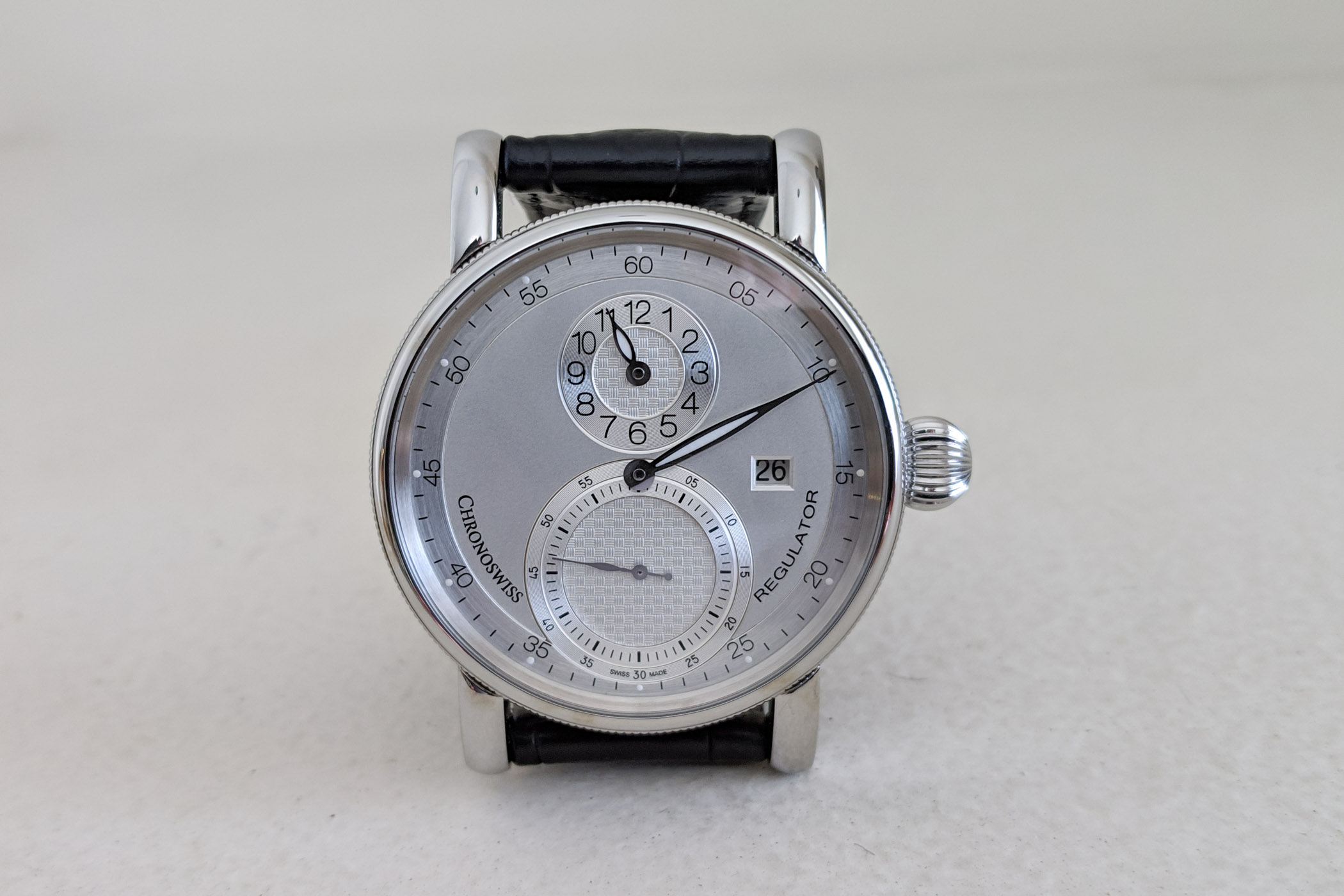
It’s not easy designing a watch that really differentiates itself from the crowd. Obviously, there’s more to a watch than an outward appearance and I’m generalizing, but I’ve always liked brands that have a distinct style that’s easily recognized. You know a Panerai, Rolex or Roger Dubuis when you see it, for example. You can also spot a Chronoswiss in the crowd with its knurled case and oversized onion crown, and a style it arguably does best – the regulator. I recently wrote a hands-on article about the Flying Grand Regulator Skeleton Limited Edition, which was an almost futuristic take on the regulator setup. Its Regulator Classic Date is a more subdued and traditional piece, yet maintains the Chronoswiss DNA throughout. Let’s take a closer look at the silver edition of a future classic.
BACKGROUND
Chronoswiss is a surprisingly young watch company and has been on the scene for just 35 years. It produced its first regulator piece in 1987 and is probably best known for this style. The regulator dates back to the early 18th-century when master clocks were used to set the time for newly produced timepieces. To make this easier, they had a non-coaxial face that separated the hands (hours, minutes and seconds), keeping the minute hand prominent. The other hands were less important and decentralized, but visible if needed. Modern technology makes this all null and void today, but the styling is cool nonetheless.
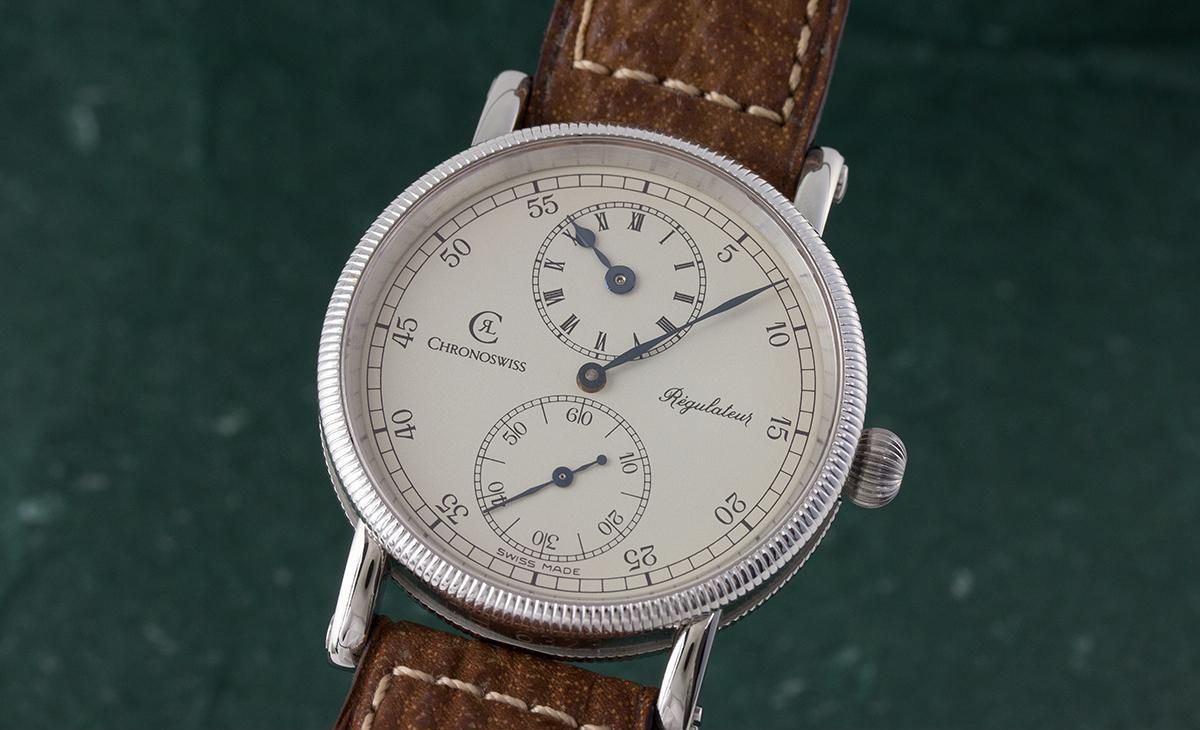
Chronoswiss was founded in 1983 in München, Germany by Gerd R. Lang, who already had extensive experience producing movements for other brands. The company designed unique and intricate watches from the start, including the Opus (first skeletonized chronograph), tourbillon and quarter repeater models. It was the first company to manufacture a wristwatch with a regulator layout, the Régulateur, and is now famous for producing hand-finished regulators in many styles. Modern pieces like the Flying Regulator Open Gear keep its lineup fresh and intriguing, while more classic models like the Regulator Manufacture exude an old world charm. It also produces more traditional watches with centrally mounted hands, including models from its Sirius and Time Master lines.
In 2012, Chronoswiss was acquired by Oliver Ebstein and the headquarters was moved to Lucerne, Switzerland. There’s a “House of Chronoswiss” inside the headquarters that allows visitors to view luxury watchmaking first-hand, with techniques such as high-fire enamelling and engine turning (guilloché) on display. The heart and soul of Chronoswiss haven’t changed with the acquisition and its limited production timepieces, especially the regulators, are a clear differentiation mark.
CASE AND DESIGN
The 41mm stainless steel case is classic Chronoswiss with knurled edges on the top and bottom, oversized onion crown and sizeable lugs with rounded ends dipping inward (height is 12.93mm). The knurling is a little less conspicuous than on previous models, but still adds a nice punch to the sides. Although not a particularly large case, it has a commanding presence on the wrist and a nice weight. The top of the lugs and bezel are polished, while the rest of the case is brushed, giving it clean, upscale aesthetic.
The strap is held on by screws with polished heads, which contrast nicely against the brushed side surfaces of the lugs. The caseback is brushed steel with a sapphire exhibition window, showing off the Calibre C. 292 automatic, and the main crystal is a flat sapphire with an anti-reflective coating. The signature large onion crown, which might not appeal to some (I happen to love it), doesn’t screw down, but the watch is still water-resistant to 100m. The case isn’t overly complex, but all of these elements combine into a unique package that won’t be mistaken for any other brand.
DIAL AND HANDS
The galvanic silver dial has a frosted finish with a darker silver minute track spanning the outer perimeter. Numerals are printed every five minutes on the track with a spot of Super-LumiNova above each. The rhodium-plated, leaf-shaped hands are set up in the classic regulator style (they can technically be anywhere as long as they’re separated) with the hours on top, large minute hand in the centre and seconds on the bottom. Starting with the upper hour hand, the outer ring of the sub-dial is a darker silver that matches the minute track, with all twelve numerals printed. The inner section has an engine-turned, silver guilloché pattern that matches the larger seconds sub-dial at the bottom. The hour hand also has a strip of Super-LumiNova.
Centrally mounted on the main dial is the large minute hand, which is the focal point of a traditional regulator. It actually sits on the outer rim of the oversized seconds sub-dial at the bottom, which is an interesting design choice. The minute hand, also with a strip of Super-LumiNova, is hand-bent for a slight contour as it reaches the outer edge of the minute track. The large seconds sub-dial extends all the way to the bottom edge of the hour sub-dial. The outer silver rim has numerals printed every five seconds, while an inner rim has a detailed track for every second. The same guilloché pattern from the hour sub-dial fills the inner section. The seconds hand doesn’t have lume, but does have a nice counterweight that the other hands lack.
A bevelled date window sits at 3 o’clock and is unobtrusive, fitting in well with the dial elements. My only complaint would be that it’s small and somewhat hard to read indoors. CHRONOSWISS tastefully curves down the left bottom edge of the dial, while REGULATOR curves up the right bottom edge. The design is deceptively complex and makes for a classy dress watch that can also fit in with a T-shirt and jeans weekend.
MOVEMENT
The beating heart of the Chronoswiss Regulator Classic Date is the Calibre C. 292 automatic, which has 30 jewels, beats at 28,800vph (4Hz) with a 38-hour power reserve. It also has Incabloc shock protection. It is based on an ETA calibre on top of which the brand adds a regulator module.
When viewed from the exhibition caseback, there are Geneva stripes on the rotor that stop short of a bevelled edge. Chronoswiss and the company logo are engraved at the bottom portion of the Geneva stripes. Perlage is seen on bridges and plates, and blued screws dress things up as well. It’s a handsome movement that’s not overly embellished and fits the overall aesthetic of the piece very well.
STRAP
A 21mm black Louisiana alligator leather strap comes with the silver Regulator Classic Date equipped with a stainless steel folding clasp. I found this one to be a little fiddly, but it looks great on the wrist and is a minor complaint. It’s also well padded and won’t need much of a break-in period, but was a bit stiff when first strapped on. The company logo is on a separate circular plaque at the end of the buckle, which is a nice detail. The silver, black and red variant comes with a perforated calfskin strap with red inner leather and a folding clasp, and a steel bracelet is also available. All other models have the black alligator pin buckle strap.
CONCLUSION
I’ve always liked Chronoswiss regulator watches. The brand is at its best with this type of timepiece and has an interesting variety in its portfolio. I’d go so far as to say that I’d be hesitant to buy a regulator from any other brand. I really like the new Flying Regulators, particularly the Open Gear series with their modern, architectural design that really stands out. The simpler designs, however, like the Regulator Manufacture and Regulator Classic Date have an understated elegance that few brands can match in this price range.
It may take a day or two to get used to the rather unconventional regulator setup, but once you do it’s a joy to consult the dial. I would compare it to driving a manual transmission in a fancy sports car. Once you become accustomed to it, it can be hard to use anything else. The Regulator Classic Date may not be its most fancy or intricate piece, but it’s very classy and never gets old, and there are few watches I’ve enjoyed wearing as much.
The Chronoswiss Regulator Classic Date sells for CHF 3,870. The stainless steel bracelet brings it up to CHF 4,265. Dial variations include blue and black, black and silver, and silver, black and red. The company doesn’t have the history that many high-end brands can boast, but in its less than four decades of existence, it has become a household name in the luxury watch sector. You can purchase a regulator online at the Chronoswiss site or at participating retailers worldwide. More details on www.chronoswiss.com.

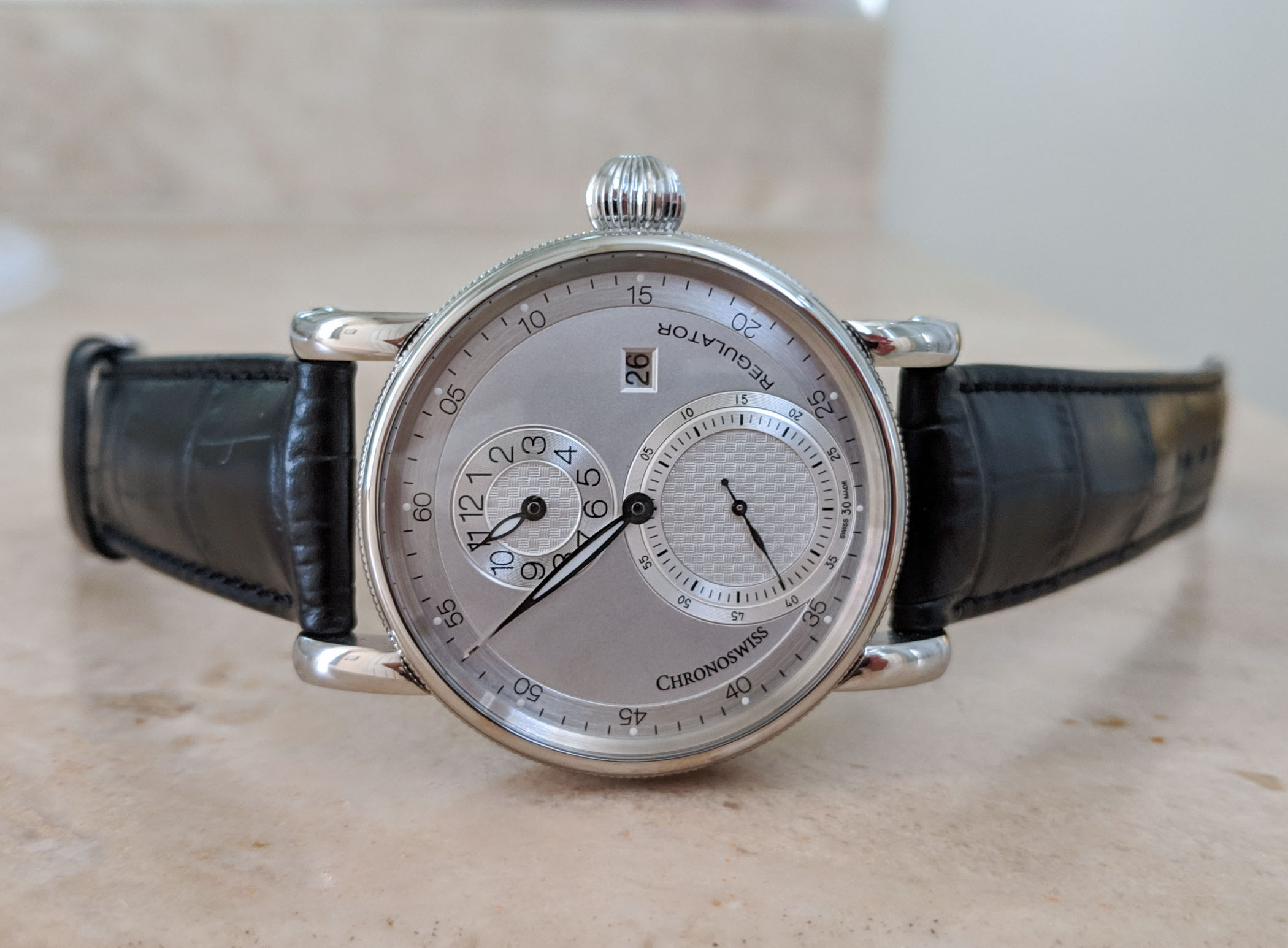
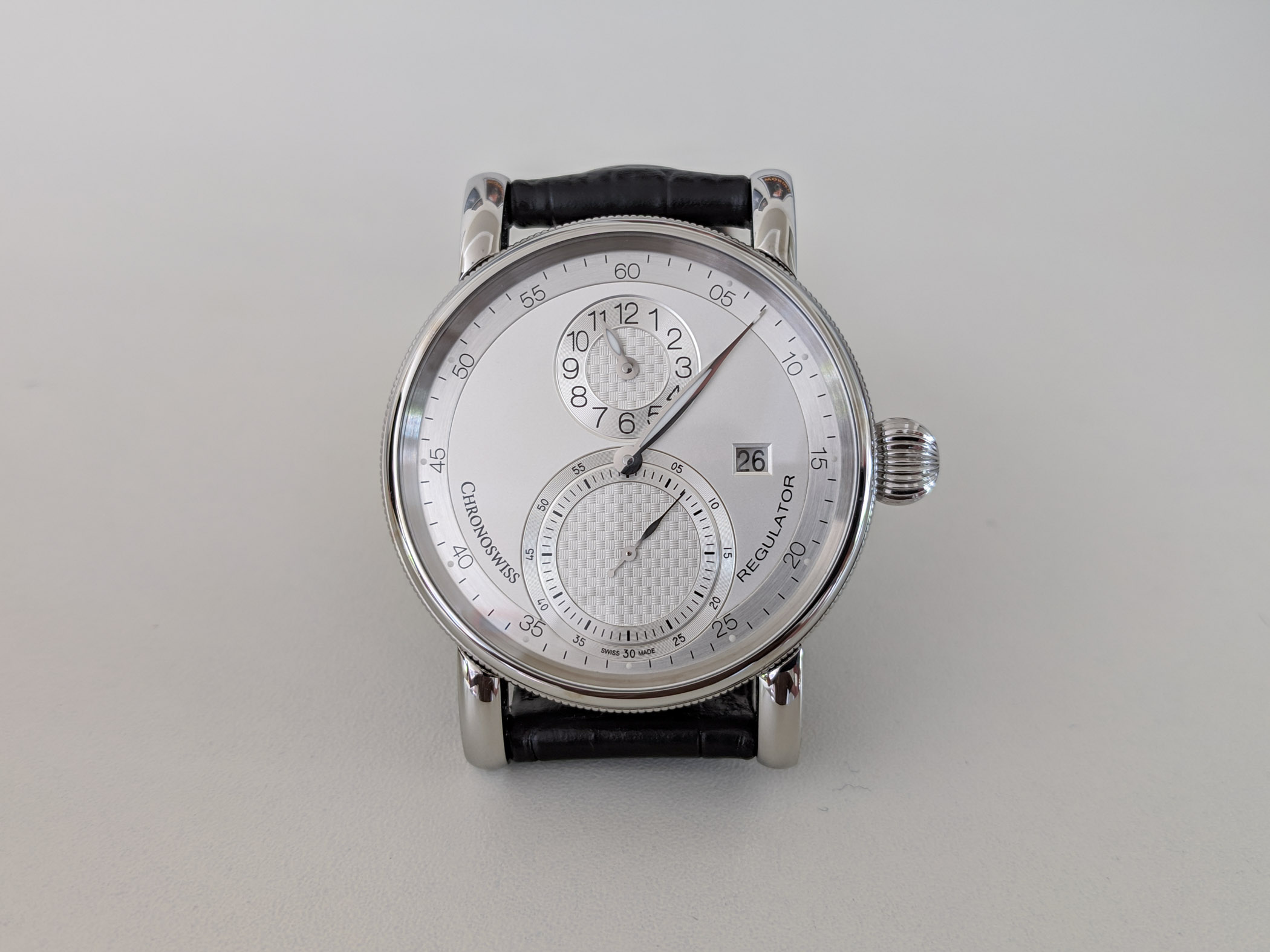
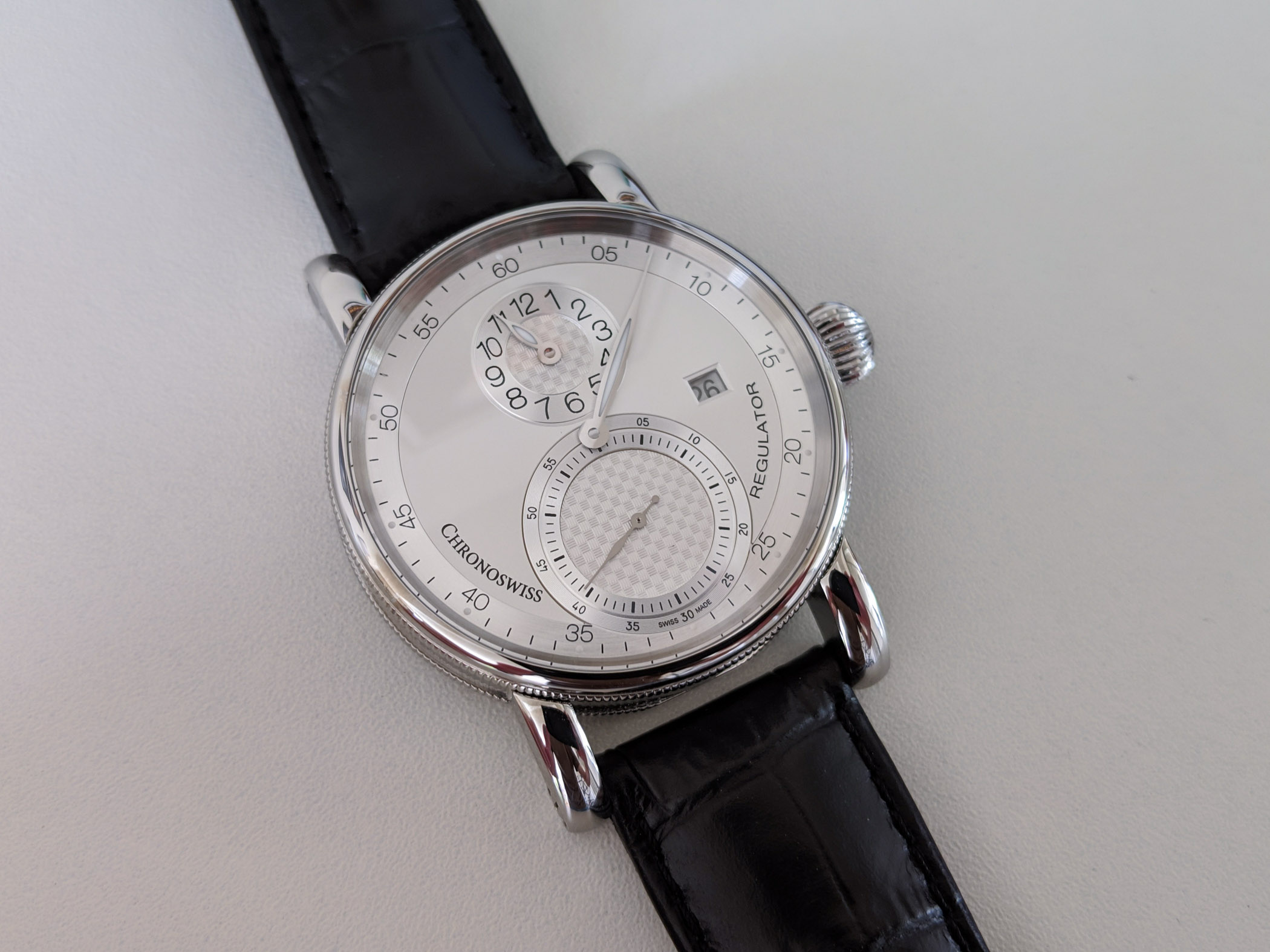
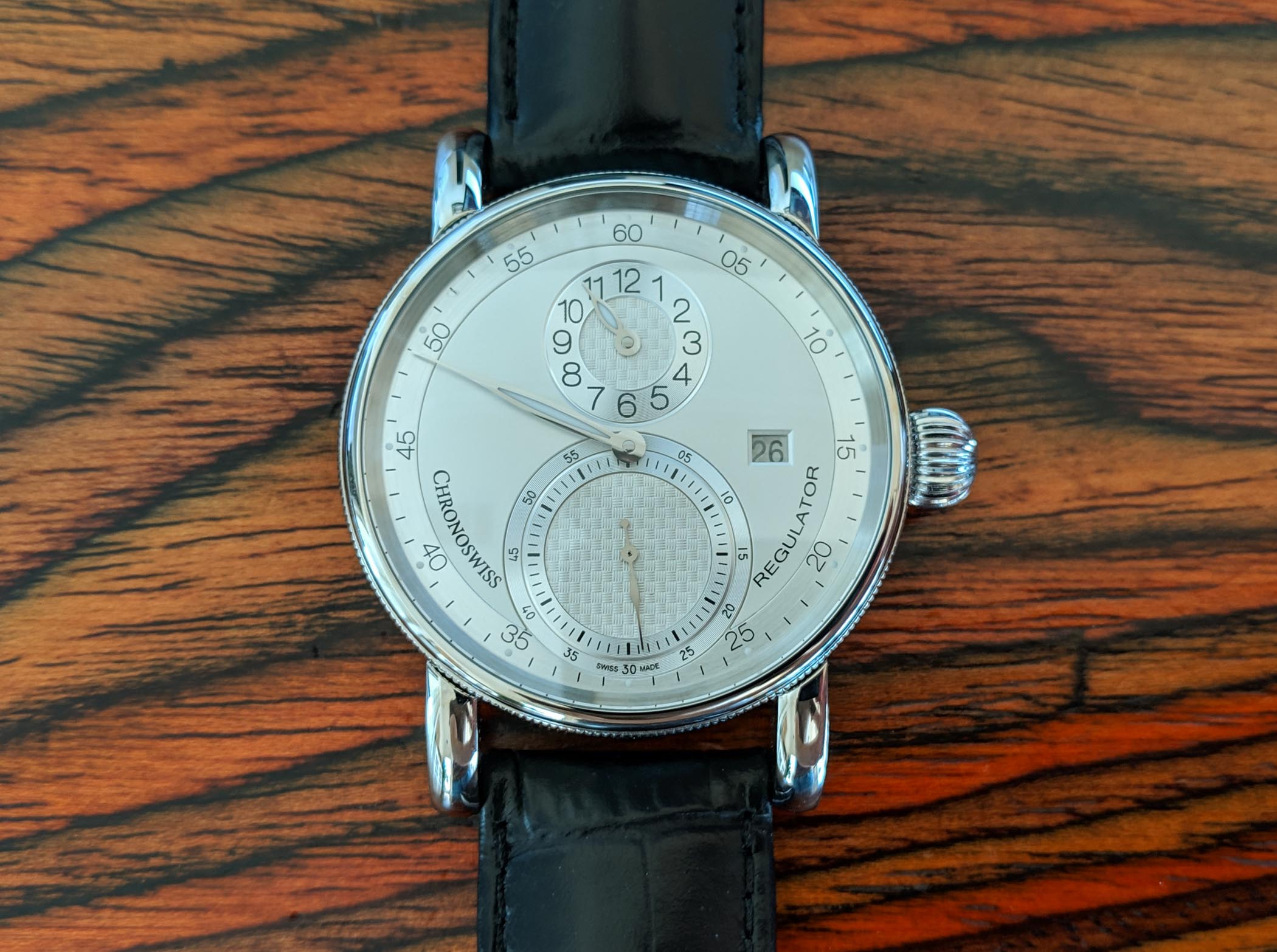
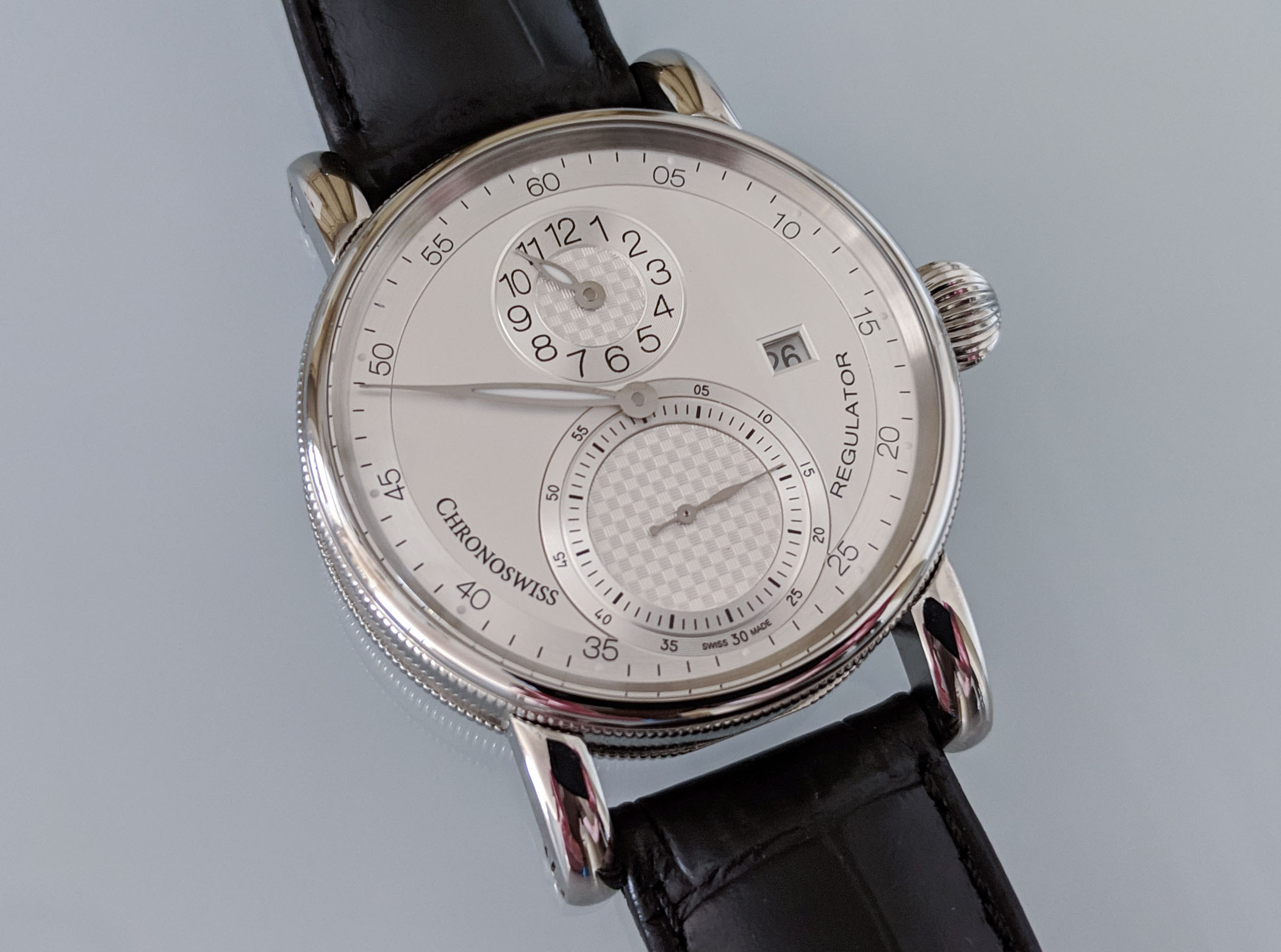
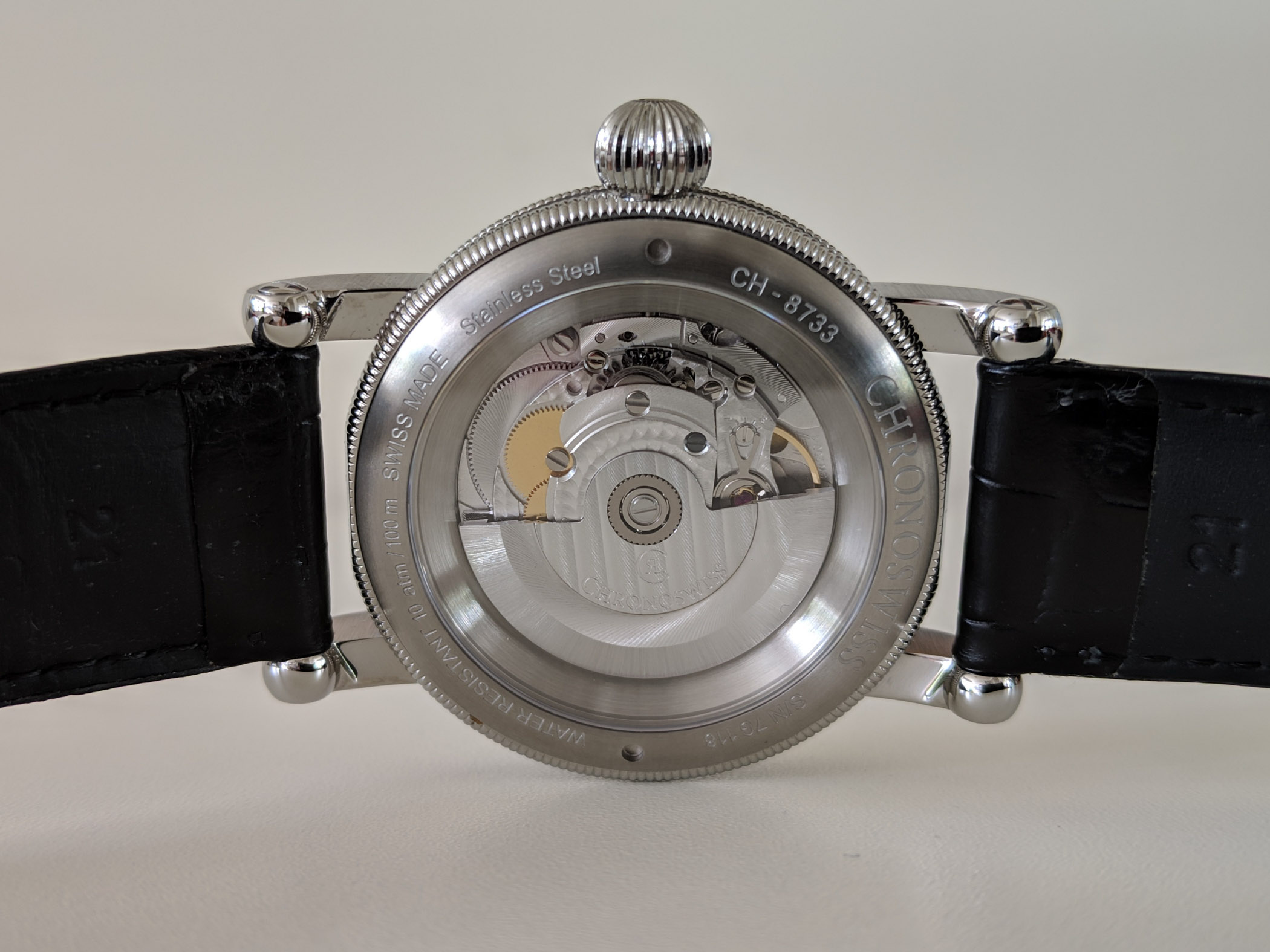
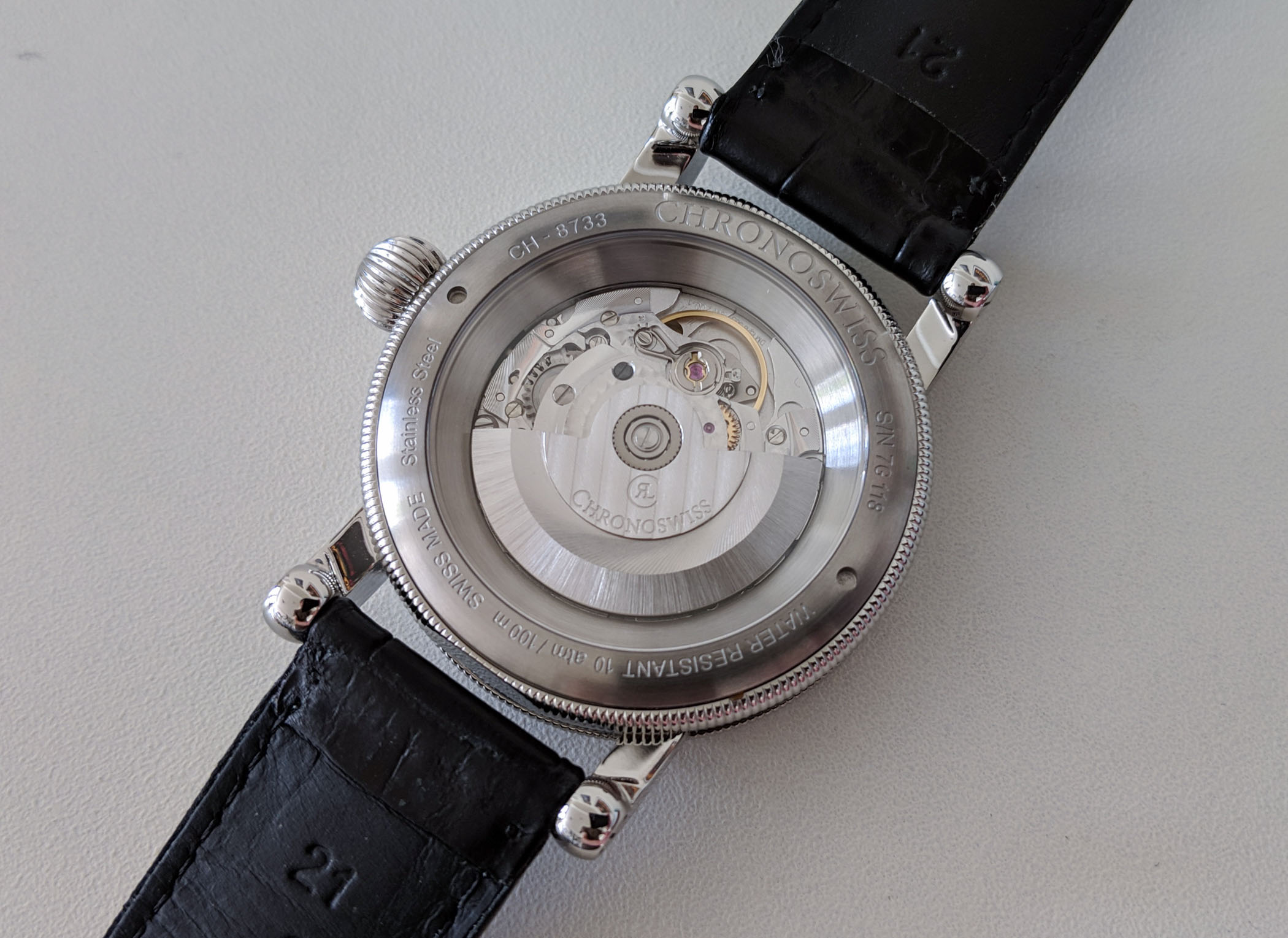
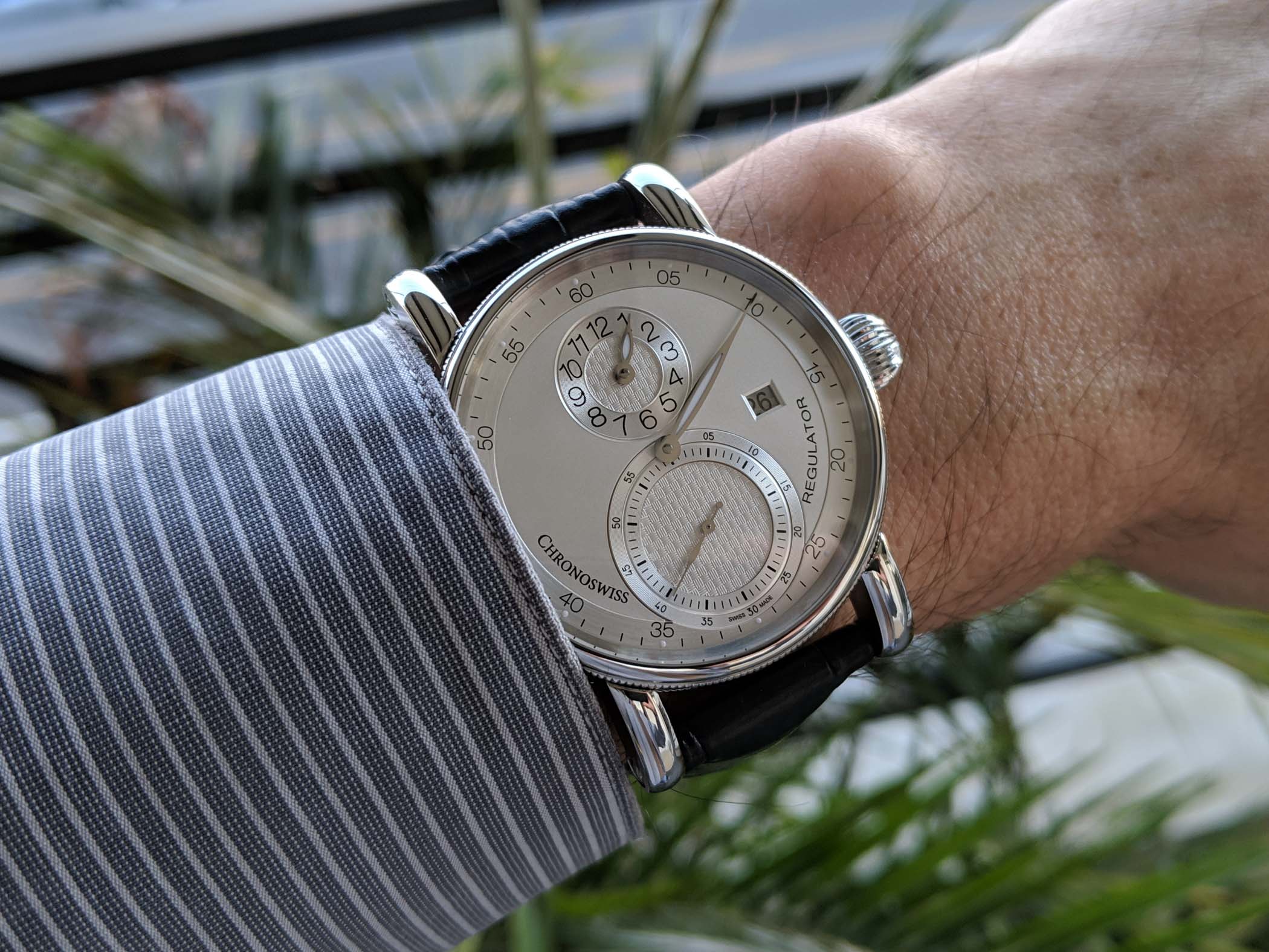

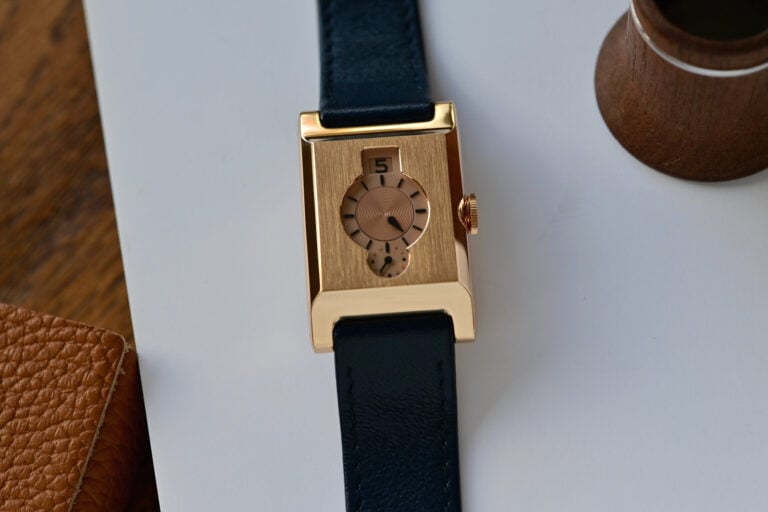
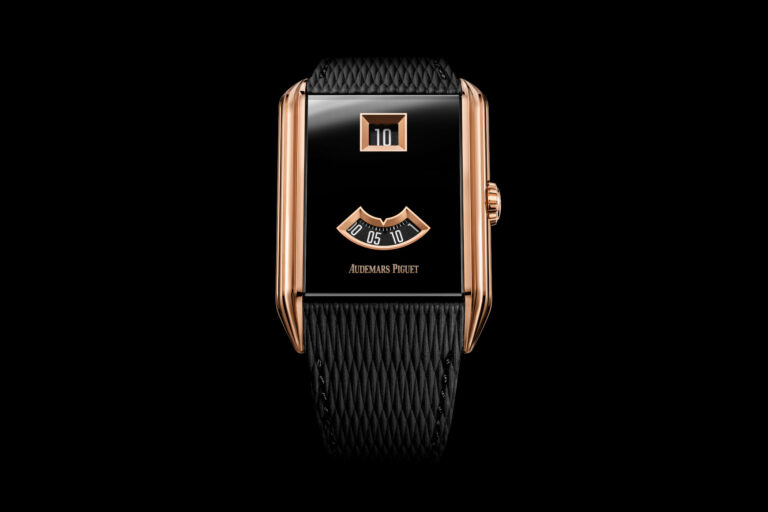
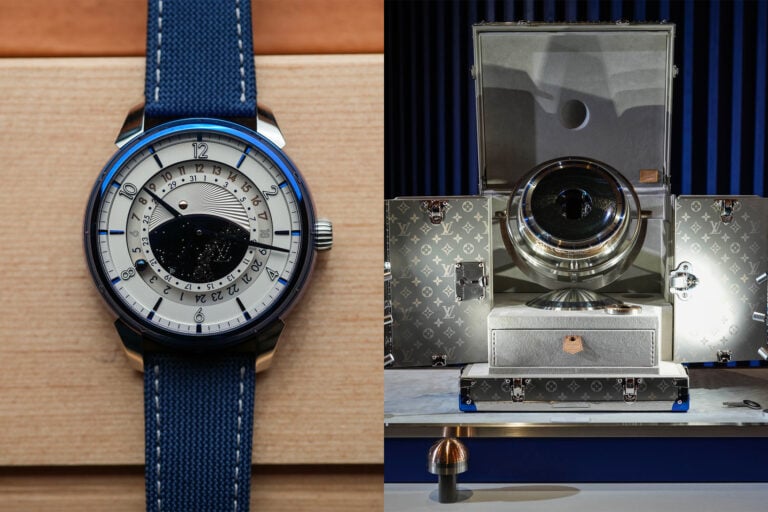
5 responses
I like regulators and have browsed Chronoswiss’s collection more than once with an approving eye (especially over their jumping hour model), but this particular watch looks…less than appealing, let’s just say. The 1990s model you show, however, is very nice, having a similar style to something like a Dornbluth & Sohn regulator.
I agree with you Gil. However i think the 1990 model which is far better than today’s looks more like an Erwin Sattler regulator rather than Dornblueth. Other than that I also absolutely love the glashütte senator regulator which ks superbly done. Ive seen one in the flesh a couple of days ago at an AD and pics really dont do it justice.
Hola
Me llamo Francesc, estoy siguiendo este tipo de reloj, y os puedo comentar que es una movimiento sellita SW 200 con grado de precisión Elaboré,el tipo de calibre que monta, en la foto se aprecia la ref. del calibre al lado izquierdo del balance por la porte trasera,se entiende. Lleva una complicación de Duboiz-Deprez.Con minutero.
Para mi conocimiento este precio de venta por el tipo de movimiento que lleva, es bastante pero bastante sobre valorado, hay otras marcas que se vende a mitad de precio.
saludos.
Francesc.
Never heard of Erwin Sattler, but just looked it up and you’re right, it does look like that a bit more than the Dornbluth. Agree about the GO regulator – it’s a good-looking piece. In fact whenever I think of my favourite regulators, they’re all German.
Si modifican los comentarios originales que escribimos, se están engallando ustedes mismos.
La realidad del producto que enseñan en el articulo es mediocre y la precio de venta carisimo.
Haber si es lo escriben tal cual.
Chao.